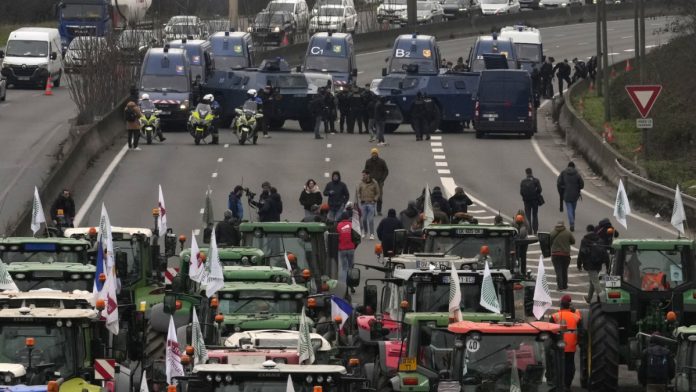Now the tractors are leaving again, whole caravans of them. With a third series of promises and concessions in just a few days, the French government has managed to satisfy the angry farmers and avert a threatened escalation of the protests.
The two largest farmers' unions, the FNSEA and the Jeunes Agriculteurs, have appealed to their members to lift the blockades on motorways and roads and return to their farms in an “orderly” manner. “Tangible progress” has been made on a number of issues in dialogue with the government, said Arnaud Rousseau, head of FNSEA. The national association alone represents around 200,000 farmers, almost half of all French farmers. Their movement continues, but the form of action is changing – at least for now. If the concessions turn out to be sensationalism, you'll quickly be back on the streets.
The solidarity of the French was massive
Before that, France's new Prime Minister Gabriel Attal had made a little more concessions to the farmers. He promised livestock breeders 150 million euros a year in tax reductions and subsidies. The sovereignty of French agriculture should be enshrined in a law, and he will also ensure that. He also suspended indefinitely the “Ecophyto” action plan, which aims to reduce the use of pesticides. Most farmers would have preferred it if Attal had overturned it completely. But the suspension also provoked harsh criticism from environmental organizations. They say the prime minister sacrificed ecology for this deal. Attal also promised that fruits and vegetables from countries in which the pesticide thiaclopride, which is banned in Europe, was used without restrictions would no longer receive import licenses. The French themselves should initially be allowed to spray their plantations as before. However, the competitors who are also active are denied the market.
Another concern of farmers is the mistreatment by the food industry. Economy Minister Bruno Le Maire promised that he would carry out inspections of all supermarket chains “in the coming days” to check whether they adhered to the agreed price fairness.
The farmers' protest began almost two weeks ago in the southwest of the country, where cattle breeders are struggling with an epidemic that is almost depriving some of them of their existence. Over time the movement expanded and reached Paris a few days ago. All main axes leading to the capital were blocked. The solidarity of the people was massive: in surveys, up to 92 percent of French people said that they thought the protests were justified.
For Attal, who has only been head of government for a few weeks, the showdown with the farmers was an unparalleled baptism of fire – a quick test of maturity. He showed a lot of closeness, did not shy away from direct confrontation, but also quickly made very far-reaching concessions and distributed money to all the petitioners. And he has now promised once again that he will do everything in his power to oppose the conclusion of the EU's free trade agreement with the South American Mercosur states. There was great concern in Paris that the farmers' protests could spread to other dissatisfied professional categories and grow into a major movement. However, the dialogue with the strong unions never stopped.
“We are very moved by the support we have received from the entire nation, almost physically,” said union boss Rousseau. But the French's sympathy would probably soon have suffered if the farmers had continued to block the country despite the government's generous support.



